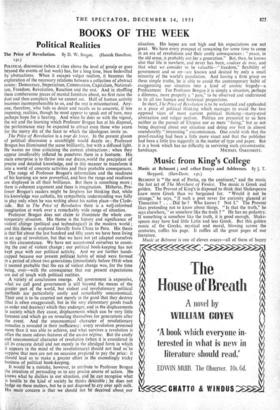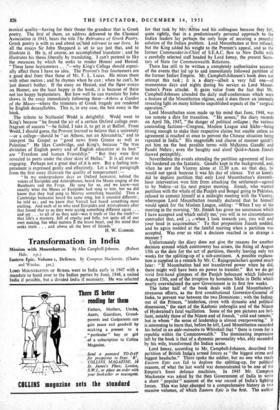Music from King's College
BEr.morrr is "the seat of Portia, on the continent," and the music the last act of The Merchant of Venice. The music is Greek and golden. The Provost of King's is disposed to think that Shakespeare knew more Greek than we bargained for. "Would it not be strange," he says, "if such a poet never for curiosity glanced, at Theocritus ? . . Did he ? Who knows ? Not I." The Provosr likes pretending not to know about things. "Is that the truth," he says elsewhere, " or somehow like the truth ? " He has no pedantry. If something is somehow like the truth, it is good enough. Shake- speare may have had little Latin and less Greek. But this golden music of the Greeks, mystical and moral, blowing across the -centuries, ruffles his page. It ruffles all the great pages of our literature.
Music at Belmont is one of eleven essays—all of them of happy
musical quality—having for their theme the grandeur that is Greek poetry. The first of them, an address delivered to the Classical Asgociation in 1943, bears the title The Relevance of Greek Poetry. Greek poetry is with us and about usNsid relevant to our lives. In all the essays Sir John Sheppard is set to say just that, and to illustrate it. He is, of course, an accomplished translator ; and he illustrates his thesis liberally by translating. I can't pretend to like the measures by which he seeks to render Homer and Hesiod. "These lame heptameters . . ."—why King's College should especi- ally affect them I have no idea. The Provost's free fourteeners are a good deal freer than those of Mr. F. L. Lucas. He mixes them with other metres ; and he rhymes when he can ; when he can't, he just doesn't bother. If the essay on Hesiod; and the three essays on Homer, are the least happy in the book, it is because of these not too happy heptameters. But how well he Can translate Sir John shows in the essay immediately following these—Athens a Garden of the Muses—where the trimeters of Greek tragedy are rendered by English decasyllables. This is, in any case, the best essay in the book.
The tribute to Nathaniel Wedd is delightful. Wedd went to King's because "he found the air of a certain Oxford college over- fragrant of success "—he failed, I take it, to get in at Balliol. From Wedd, I should guess, the Provost learned to believe that a university —or a college—should be "an Athens, not an Alexandria," and to interpret the Gospel as "good news from Greece as well as Palestine." He likes Cambridge, and King's, because "the true divinities of English poetry and of English education at its best" are "Freedom and human Friendship." "But they were first revealed to poets under the clear skies of Hellas." It is all ever so engaging. Perhaps not a great deal a it is new. But a feeling tem- perament is expressed gently and effectively. Let a brief paragraph from the first essay illustrate the quality of temperament:— "In my undergraduate days an Oxford humanist, behind the voices of Euripides and Aristophanes, heard the Muses singing of the Bacchants and the Frogs. He sang for us, and we knew—not exactly what the Muses or Euripides had sung to him, but we did know that they had sung to Murray something beautiful. Then a Cambridge humanist heard the same song, but it sounded different ; he told us ; and we knew that Verrall had heard something most exciting. And each of us who read Euripides and Aristophanes after that found that to us they were saying something different again . . and.yet . . to all of us they said—was it truth or like the truth?— that life's a mystery, full of cruelty and folly, not quite all of our own making, but what matters ii the brave heart, and the mind that seeks truth . . . and above all the love of friends."
H. W. GARROD.







































 Previous page
Previous page